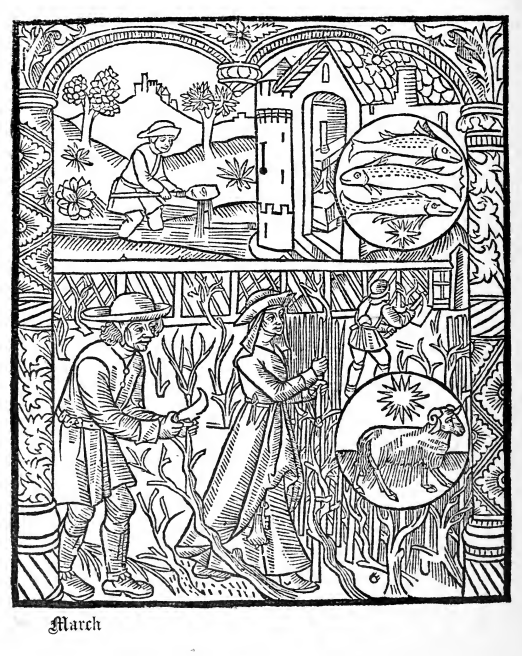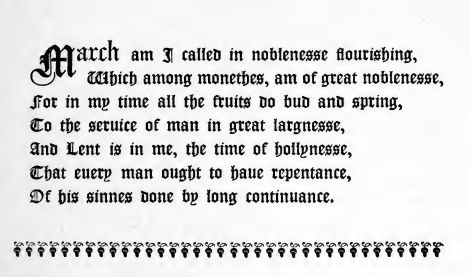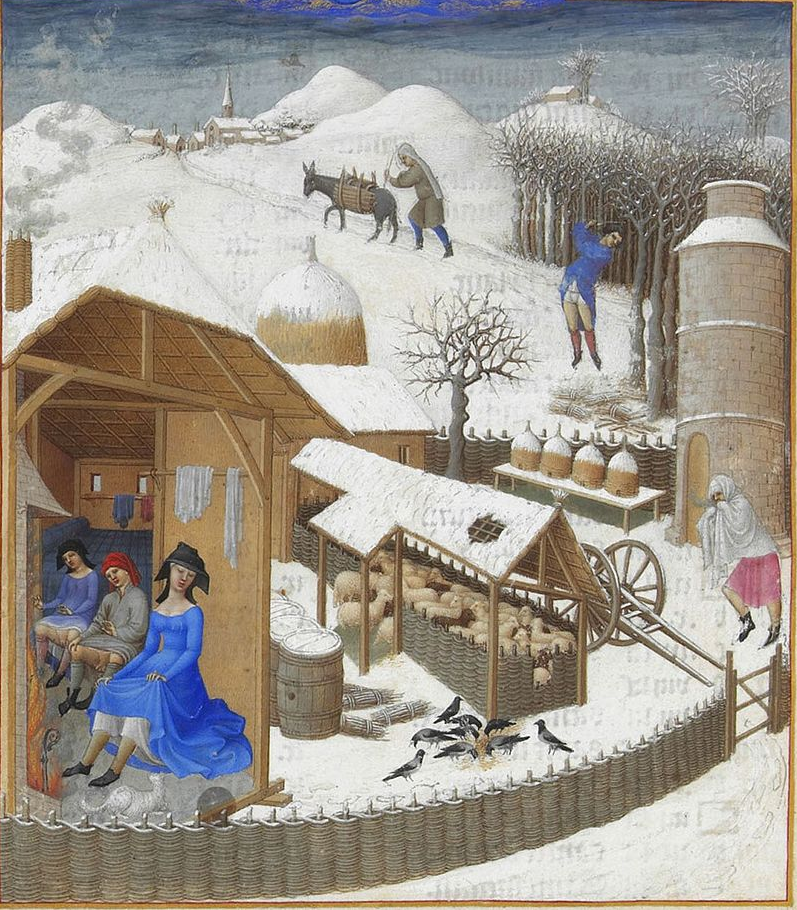
This is the beginning of Spring, metrologically speaking. There is nothing magical about this day that makes it in any sense actually the start of Spring. It is a convenience determined by meteorologists, who divide the year up into 4 blocks of three months based on average temperature. It could be the 2nd March. Or the 1st of February as the Celts favoured.
There is nothing that says we have to have 4 seasons. Egypt had three seasons for example. Plants have been blooming, sprouting and budding since January, and some will wait until later in the year. Lambs have been born since January. But scientists and society find it easiest to keep statistics on a monthly basis so March 1st it is.
Astronomically, the seasons are more rationally divided by the movement of the Sun, So Spring begins on the spring equinox, usually 21st of March.
March the 1st was the beginning of the Roman year in Rome’s early days. (see extract from Ovid’s Fasti below). Ovid says thr year started on the Kalends of March
I discuss the strange way the Romans divided the month in another post, but he is what Britannica says about the system:
‘In a 31-day month such as March, the Kalends was day 1, with days 2–6 being counted as simply “before the Nones.” The Nones fell on day 7, with days 8–14 “before the Ides” and the 15th as the Ides. Afterward the days were counted as “before the Kalends” of the next month’.
The Month was named after Mars, the God of War, as Mars was the patron God of the City. March was also the beginning of the campaign season, and the army was prepared, and ceremonies held to Mars. The Salii, twelve youths dressed in archaic fighting costumes led a procession singing the Carmen Saliare. Ovid reports in his poem Fasti (3.259–392).
In Welsh the month is called Mawrth, (derived it is thought from the Latin Martius). Gaelic Mart or Earrach Geamraidth – which means the ‘winter spring’. In Anglo-Saxon ‘Hrethamonath’ the month of the Goddess Hretha. The evidence for the name comes from the Venerable Bede in his ‘The Reckoning of Time, written in 725 AD. Nothing else is known about her. Her name is Latinised to Rheda. J R. R. Tolkein used the Anglo-Saxon calendar as the calendar for the Shire where the third month is called Rethe.
For the Anglo-Saxon spring was looked forward to with great joy after the bleakness of winter. Christian Anglo-Saxons also saw this as the pivotal month in the year. It was in March that the world was created, and the Messiah conceived, revealed, executed, and ascended to heaven.
The illustration, from the Kalendar of Shepherds, shows that in Pisces and early Ares preparation was still the main order of the farming day, clearing out the moats, and preparing the fruit trees. Lambing is also increasing in number.
It is also the Feast of St David, the patron saint of Wales, who lived in the sixth century AD. Little that is known about him is contemporary but he was an abbot-bishop and important for the independence of the Welsh Christian tradition.

Ovid Fasti Book 3
At the beginning of this book Ovid provides the story of Rome’s foundation, and how Mars took Silvia the Vestal while she slept. She later gave birth to Romulus and Remus. He also gives details of how Rome was organised and in the piece of the long text I have chosen below he discusses the arrangement of the year as Romulus decided upon. It is a year that began on the 1st March, and had only 10 months which is the number of digits we have and the length of pregnancy (so Ovid says). I wrote about Caesar’s reforms of the Roman year, yesterday. See here
Ovid wrote:
So, untaught and lacking in science, each five-year lustre
That they calculated was short by two whole months.
A year was when the moon returned to full for the tenth
time:
And that was a number that was held in high honour:
Because it’s the number of fingers we usually count with,
Or because a woman produces in ten months,
Or because the numerals ascend from one to ten,
And from that point we begin a fresh interval.
So Romulus divided the hundred Senators into ten groups,
And instituted ten companies of men with spears,
And as many front-rank and javelin men,
And also those who officially merited horses.
He even divided the tribes the same way, the Titienses,
The Ramnes, as they are called, and the Luceres.
And so he reserved the same number for his year,
It ís the time for which the sad widow mourns her man.
If you doubt that the Kalends of March began the year,
You can refer to the following evidence.
The priest’s laurel branch that remained all year,
Was removed then, and fresh leaves honoured.
Then the king’s door is green with Phoebus’ bough,
Set there, and at your doors too, ancient wards.
And the withered laurel is taken from the Trojan hearth,
So Vesta may be brightly dressed with new leaves.
Also, it’s said, a new fire is lit at her secret shrine,
And the rekindled flame acquires new strength.
And to me it’s no less a sign that past years began so,
That in this month worship of Anna Perenna begins.
Then too it’s recorded public offices commenced,
Until the time of your wars, faithless Carthaginian.
Lastly Quintilis is the fifth (TXLQWXV) month from March,
And begins those that take their names from numerals.
Numa Pompilius, led to Rome from the lands of olives,
Was the first to realise the year lacked two months,
Learning it from Pythagoras of Samos, who believed
We could be reborn, or was taught it by his own Egeria.
But the calendar was still erratic down to the time
When Caesar took it, and many other things, in hand.
That god, the founder of a mighty house, did not
Regard the matter as beneath his attention,
And wished to have prescience of those heavens
Promised him, not be an unknown god entering a strange
house.
He is said to have drawn up an exact table
Of the periods in which the sun returns to its previous
signs.
He added sixty-five days to three hundred,
And then added a fifth part of a whole day.
That’s the measure of the year: one day
The sum of the five part-days is added to each lustre.
Translated by A. S. Kline online here:

